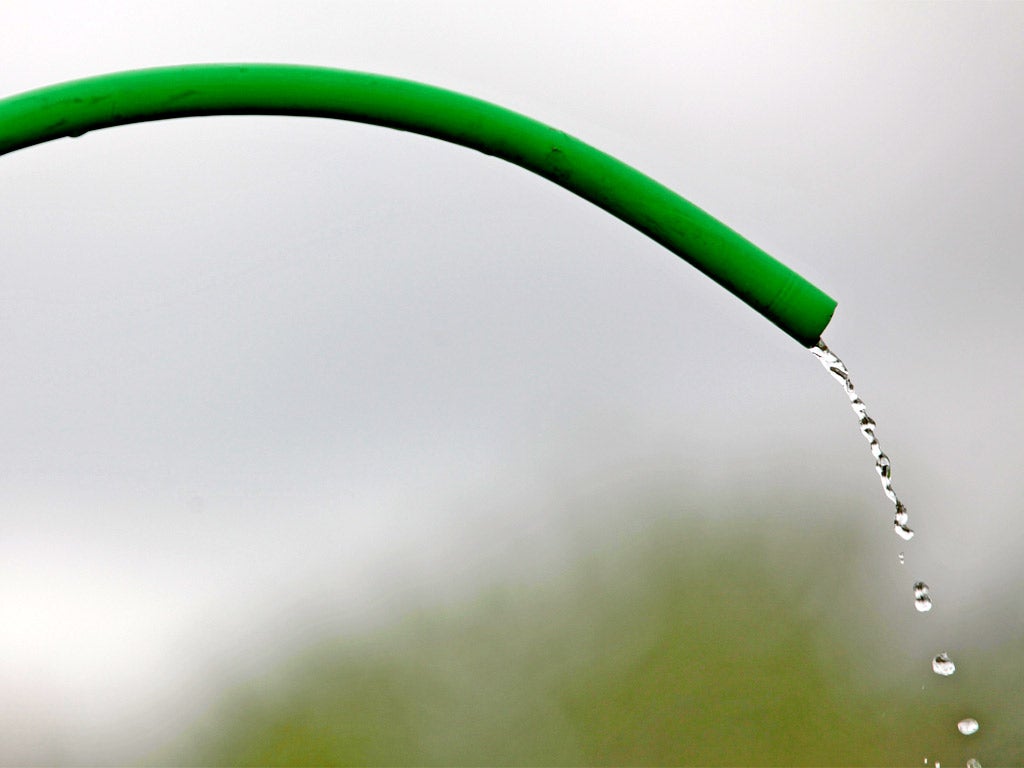Get ready for along, dry summer
With hosepipes banned in some areas, a lack of water could impact us all. By Charlie Cooper

Twenty million people in the south and east of England awoke to the first day of a hosepipe ban this morning, as emergency drought measures imposed by seven water companies came into effect.
From midnight, people in the south and east risk fines of up to £1,000 for using a hose for all but a few exempted activities. Two consecutive dry winters have taken their toll on the south's reservoirs and groundwater levels, leading to severe drought conditions that are expected to last all of spring and summer. It may be many months before gardeners can turn the sprinklers back on.
Although rain is now falling across much of the south east the Environment Agency has warned that it is now unlikely that groundwater levels can be replenished in time to avoid a long-lasting drought.
For two years in some parts of the country, reservoirs and underground water sources have not been replenishing fast enough. In Bewl in Kent and Ardingley in West Sussex reservoirs have had to be refilled from depleted rivers. Water levels are below normal at most UK reservoirs and some are reported to be at half-capacity.
Thames Water, Anglian Water, Southeast Water, Veolia Central and South East – which service London and much of the south-east – and Sutton and East Surrey water, are all imposing "temporary use" bans on hosepipes.
The ban only applies domestically, meaning hoses used for farming, commercial cleaning and sports grounds for national and international events will not be subject to restrictions.
Water companies insist the ban will be "self-policing", but penalties can still be enforced under law and neighbours will be able to report violations.
"We would appeal to customers to act responsibly," said a spokesman for Anglian Water. "We really hope that fines wouldn't be necessary."
In some areas, "yellow card" letters will be sent out to people known to be defying the ban, followed by a visit from officials before any prosecution. A third of people responding to a survey on HosepipeBan.org, a popular web forum, said they would report a neighbour using a hose. In a separate survey on the site, another third of people said they would defy the ban altogether.
Richard Aylard, Thames Water's sustainability director said: "After two dry years we have to prioritise the most important uses of water. That means keeping everyone's kitchen and bathroom taps supplied has to take precedence over manicured lawns."
Gardeners are already investing in equipment to help them through what may be long dry summer. B&Q reported that sales of water butts were up 196 per cent.
The ban could be adopted by other water areas if the drought continues. This week, drought conditions spread to other parts of Yorkshire and Wales, the south-west and the Midlands are also under threat. The last time a widespread hosepipe ban came into force in 2006, it lasted until January of the following year in some areas. It has only been this dry four times in the past 101 years, including the drought of 1976, when standing pipes were set up in the streets to catch rare raindrops and it became patriotic to drive a dirty car. This year's drought has been exacerbated by the sunniest March since 1929, but is still unclear how bad this year will be. While the impact on domestic water supplies is likely to limited to the hosepipe ban, the impact on the agriculture and the environment could be much more severe.
Fruit, vegetable and salad crops in the south of England could be severely affected if spray irrigation bans if drought restrictions on irrigation are enforced.
In rivers, ponds and lakes, levels are becoming so low that a number of wetland species may die or be unable to breed, while many water sources may have dried up before aquatic insects, a key part of wetland eco-systems, have fully formed.
Subscribe to Independent Premium to bookmark this article
Want to bookmark your favourite articles and stories to read or reference later? Start your Independent Premium subscription today.

Join our commenting forum
Join thought-provoking conversations, follow other Independent readers and see their replies